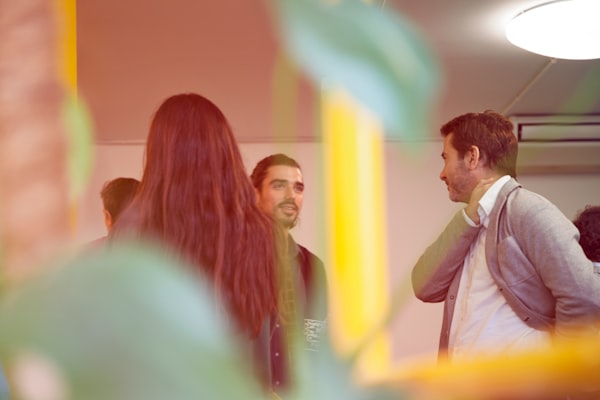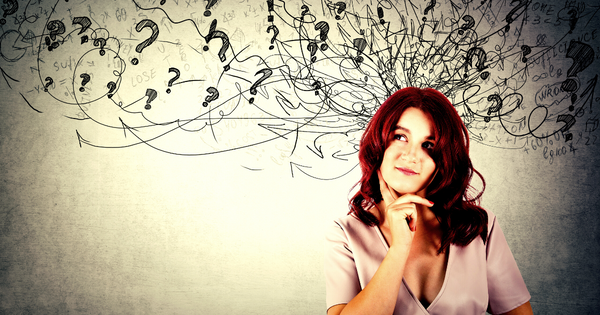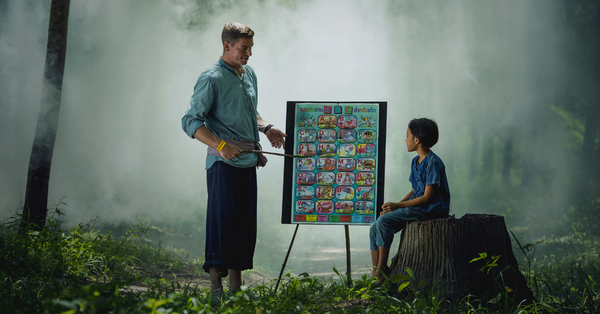Like you, last week, I woke up with horrific news. There is a war in Europe.
I feel sad, angry, and helpless. I can’t stop thinking about all the people directly affected by this crisis.
All this made me think about other crises I’ve had in my life. This is not the first time I must swallow a hard pill. There are things outside my direct control.
For good or for bad, I learned a lot from my past tragic experiences.
Today I want to talk about my learnings with you. It’s one of the things I can do to help others in all the madness around.
You can fight your helplessness. You can turn the destructive emotions related to it around. You can grow stronger. You can function and help your loved ones during and after a crisis.
I will show you how.
TL;DR:
You have a couple of options to fight your helplessness in a crisis:
- You can take action to try to solve it
- You can trust and seek help from competent people
- You can seek hope, so you move forward after the crisis ends
But before our deep dive into those options, let’s start with what a crisis is and why do you need to face it.
First thing’s first. What is a crisis?
The Oxford Languages defines crisis as “a time of intense difficulty or danger.”
It adds “a time when a difficult or important decision must be made” as a second part of the definition. I agree with both.
I want to add an essential aspect to it. A crisis is as big as you perceive it to be. Any unexpected event that brings you unhealthy stress can be solved as a crisis.
But why do you need to recognize crisis at all?
Why would you choose the hard way?
Crises are unpleasant to face. So why do you even need to face and try to solve a crisis? Can’t you just wait it out or ignore it?
As sooner or later life will bring you one, the obvious answer is:
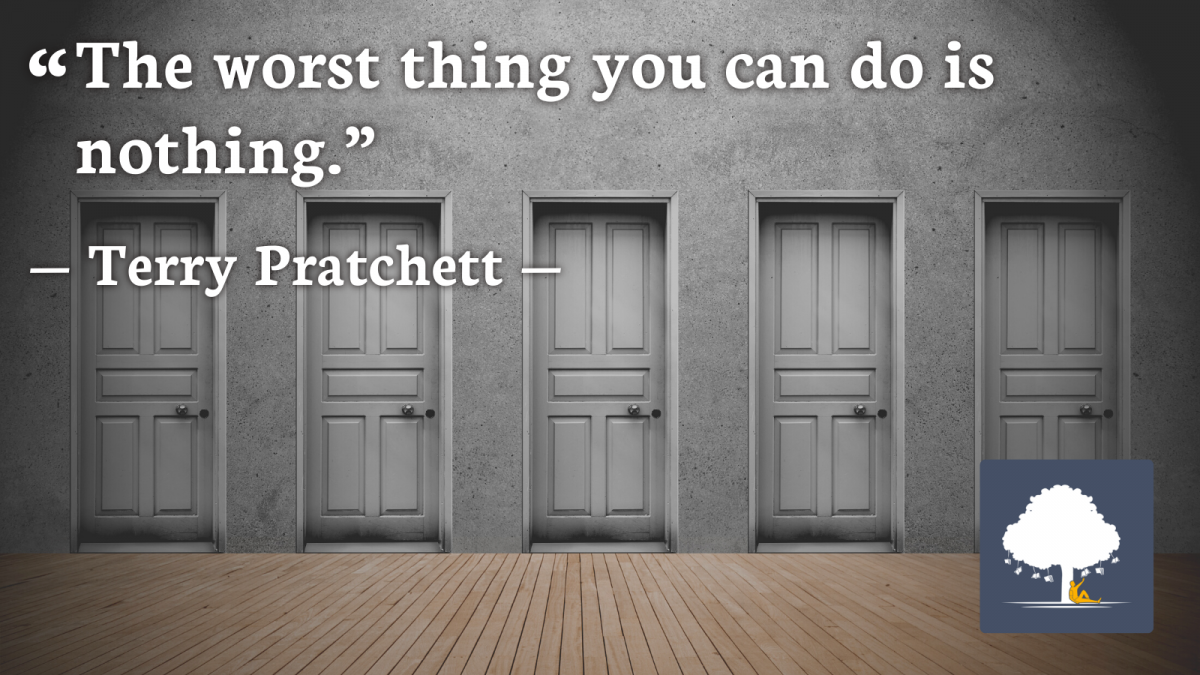
Inaction in crisis is the worst possible response.
Your stress needs to be handled. It has the nasty habit of quietly piling up and burning your energy. If the crisis has damaging consequences for a loved one, your regret will devastate you.
Ignoring a crisis may create a bigger crisis, one you can no longer ignore. The sooner you start solving the crisis, the better the chances of ending it sooner.
Okay, what actions can you take if inaction is bad?
How to face and (try to) solve a crisis?
Four things can help you solve a crisis:
- Urgent actions. These are the immediate actions you need to take to get the situation under control, stabilize it or even end it.
- Important actions. Actions you take today, so you can face the crisis tomorrow.
- Emotional actions. They can help you feel better. Or they can create your own false sense of control.
- Acceptance you can’t control some things. The only consolation you have is that you did everything in your power to solve it.
You consistently repeat those actions until you solve the crisis or until it ends.
If only it was that straightforward.
The first time I faced a severe crisis in my life was when my mom was diagnosed with cancer.
Let me share how it went for me and what I learned.
The first tragic event. The first important lesson.
The most important learning:
I remember I froze when I heard the confirmation of the diagnosis.
I knew when to call 112 (the European equivalent of 911).
I knew how to give first aid.
I knew the first things you do when an IT project goes south.
Past me had no idea what do you do immediately after hearing your mother is likely to die soon. Or that her life will never be the same.
I could only help with the quick decisions the doctor was asking us to take. Then ask about the prognosis, the treatment, and what the future looks like with this awful news. I was lucky the doctor was urging us to take action. Thanks to him, we took the first urgent actions to increase my mom’s chances to live longer.
When we came home, I did tons of other things. I called at work to tell I was not working the next day. I helped my mom collect baggage for the hospital. I took her to a nice dinner to cheer her up. Those were important actions to take, so my mom and I could face the crisis tomorrow.
In this situation, I made a mistake you should avoid. I forgot to think about myself.
On that first horrible day, I did a thousand things. I hoped that they could end the crisis faster.
I called the hospital three times to confirm what we had already agreed with the doctor. I checked my mom’s baggage 40 times. I changed the reservation for dinner 5 times as I wanted the best restaurant. I could not sleep and googled everything there was about my mom’s diagnosis.
Those were emotional actions. They helped me feel better.
The thing is, I continued with my emotional actions at high speed throughout the entire week. On the weekend, I was so exhausted I fell into deep 20 hours of sleep. If my mom needed me during that time, I wouldn’t have been able to help her.
Luckily, she didn’t.
Be mindful of your actions in crisis. Always ask yourself, “Does this action help to a positive outcome of the crisis I am solving?”
In the end, I had to accept that I could not “solve” my mom’s disease. She passed away 4 years after, not giving up the fight with her cancer for even a minute. She was an example of a high spirit the doctors admired and respected. They told me she died a victor and a hero. They’ve never seen a patient and a child so devoted to fighting the odds of this terrible illness. All the patients told me we gave them hope.
That is the consolation I have.
Your actions during a crisis are one way to fight your helplessness.
What other options do you have?
Trust and seek help from competent people.
We live in the 21st century, regardless of what some politicians think.
Having easy access to information is tremendously helpful. The chance to express solidarity and connect with the world is a blessing.
All this can also give you a false sense of control. Be very careful about it, especially if you are witnessing a crisis. Feeling in control and being in control are not one and the same thing.
Being informed and being competent are also not one and the same thing.
To cope with your helplessness in crisis, you need to trust and seek help from competent people.
What do I mean?
When there is a fire, and the fire force arrives, you don’t show them a YouTube video on putting off a fire. You trust their competence.
A crisis is often complex.
Ask yourself what is in your scope of competence and decisions in a crisis. Take action.
Then admit what is beyond you and trust and seek help from competent people.
In the current situation, I have to accept that I can post, protest, and donate, but I cannot stop a war by myself (I wish I could!). It’s beyond me. I have to trust other competent people who think like me to stop it.
To be brave, no matter what kind of threats are flying around in the news is my decision, and it is also in my competence.
I witnessed so much courage, selflessness, and bravery by the Ukrainian people. My personal learning? To be afraid in this situation is a damn shame!
Taking care of my mental health is also my decision. So my team and my loved ones have my support. And I have theirs.
However, it is not in my competence. I need help from someone who practiced fighting against destructive emotions a lot.
I learned to trust and seek help from competent people the hard way. I wish you don’t.
The second tragic event. The second important lesson.
The most important learning:
“If you break, we all break. Don’t break.”
— One of my friends
This is the only clear memory I have from a terrible night in the second major crisis I faced in my life.
One year after my mom passed away, I got a phone call. Two of my friends were killed in a horrific scenario. The situation was so unreal because we all knew the killer.
This day and evening are in a blur. My first urgent action was: “Everyone, tonight at my place.” My second action was to pick up one of my friends from the police station, as I knew she was alone there.
The rest I don’t remember clearly. I am sure I fainted once or twice.
What I remember from that horrible evening is one of my friends telling me not to break, for everyone’s sake. We stood together and talked that night. Then we took other necessary and emotional actions. We repeated.
This horrific crisis ended with lawful justice. I will not dig into the ugly details of it.
I will share the mistake I made. I thought I could stay strong without any help.
I entered into my established routine. I had calls with all of my friends at least once per day. I started doing sports again. I focused on my projects at work.
4 months later, one of my friends talked to me, telling me everyone was concerned. Nobody has seen me crying, not even once. Everyone saw me losing a significant amount of weight.
I dismissed the concern. Tears don’t solve a crisis, and pointless dwelling on things outside my control were not in my nature. I filled my days with “to-dos,” so I didn’t have the time to grieve. Or to eat, for that matters.
Then one evening, out of nowhere, I started crying and could not stop for eight hours. I finally noticed how sick I felt from malnutrition. I could not call any of my friends, because I remembered the request not to break.
So I called a psychologist. Luckily, I was very close to seriously damaging my physical and mental health, but I got help in time.
“I find it ironic. When people have a running nose or the flu, they call a doctor. Yet, nobody even thinks to call a psychologist when sad or stressed. I wish more people call sooner before their mental flu becomes dangerous. There is no shame in talking to us.”
— My therapist
My mild depression and eating disorder got resolved only with talking therapy. That took two years.
I continued therapy for another three years because I found it valuable.
It made me a better person, a better leader, a better and more compassionate decision-maker.
Don’t wait to be on the verge of damaging your health and mind. Seek help from a competent person. Don’t postpone it, especially in a crisis.
It’s the best way to fight your helplessness.
So, we covered the actions you can take and the importance of seeking help from competent people.
But how do we move on?
Last but not least. When things are bad, apply hope.
Hope is not a strategy to solve a crisis.
It’s a strategy to continue living a meaningful life after a crisis ends.
You can find hope in your loved ones. You can find hope in the steps you take outside the crisis. You can find hope in art and music. You can read a good book.
Or, you know, you can write a silly article that is insignificant in the grand scale of things.
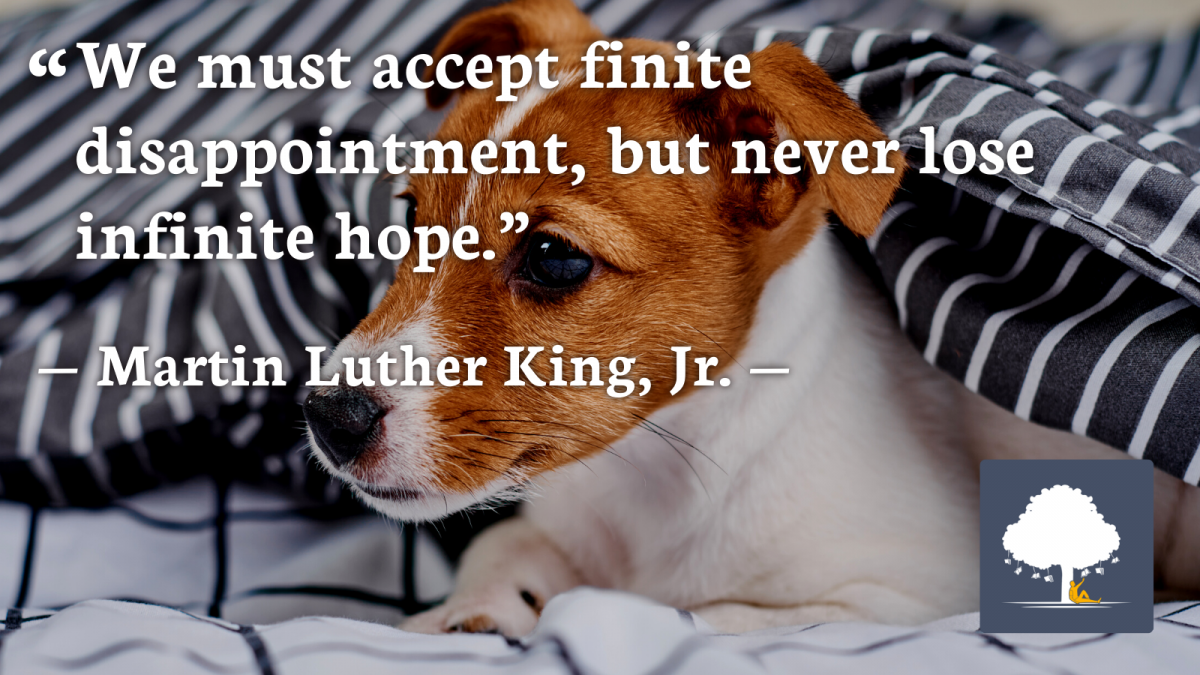
Sometimes hope comes from unexpected sources. All you need to do is take it when offered.
Thanks to my dog, I felt hope for the first time after this freaking sequence of unfortunate events.
I was lying on the bed, looking at the ceiling, doing nothing for the fifth consecutive weekend.
Then my dog jumped on the bed, waving his tail. I did not react. He jumped down and brought one of his toys. He carefully put it next to me.
I did not respond, and he respected it. He just got and gave me another toy.
And another one, until I found myself surrounded by dog toys.
My usually crazy Jack Russel was sitting calmly on the edge of the bed, with puppy eyes. He was slightly moving his tail with hope.
Say what you want, but it was his way of saying: “Hey, I am still here, and I love you. I cannot do much, but here are my toys. I hope they return some of your joy. I miss you.”
At this point, I decided it was time to get up. It was a lovely sunny day, and we took a long walk in the park. It was the first important step for me to recover.
Since then, when I feel stressed or anxious, I go with my furry friend to the park.
These walks return my hope that better days are coming ahead.
In a crisis, look for hope. Take it when offered. This is the last fight with your helplessness. This is you, moving forward.
In conclusion
Humans are fascinating creatures. You are stronger than you think. You are more capable than you think. You can act and adapt in any situation. You can move forward.
Most importantly, you are not alone. There are tons of competent people you can ask for help.
And if, in the end, your pet needs to save you, be grateful.
Better days are always coming ahead.
Stay safe, everyone!




